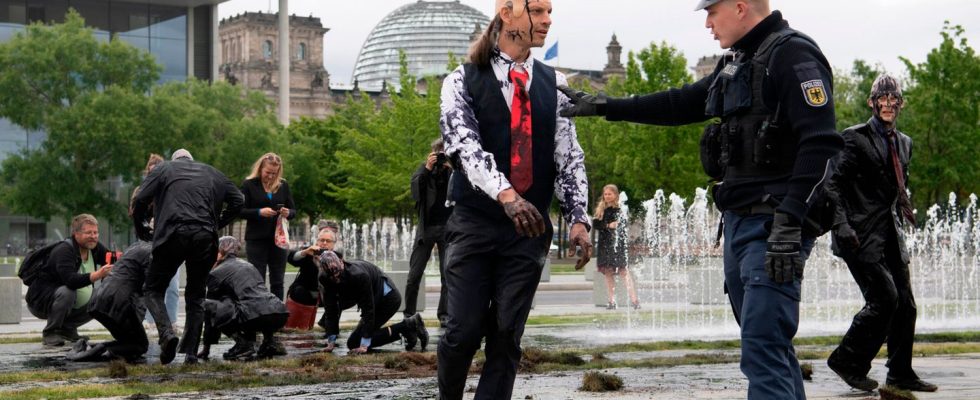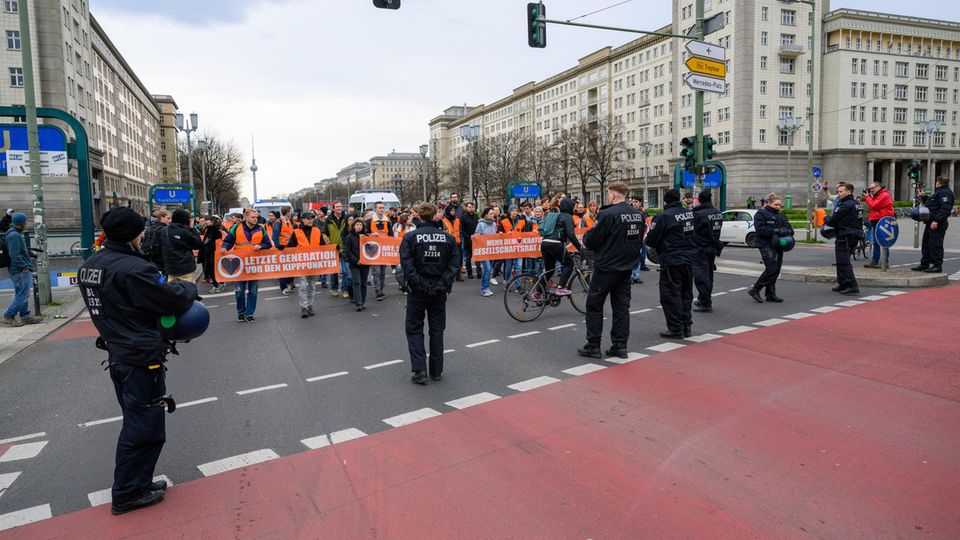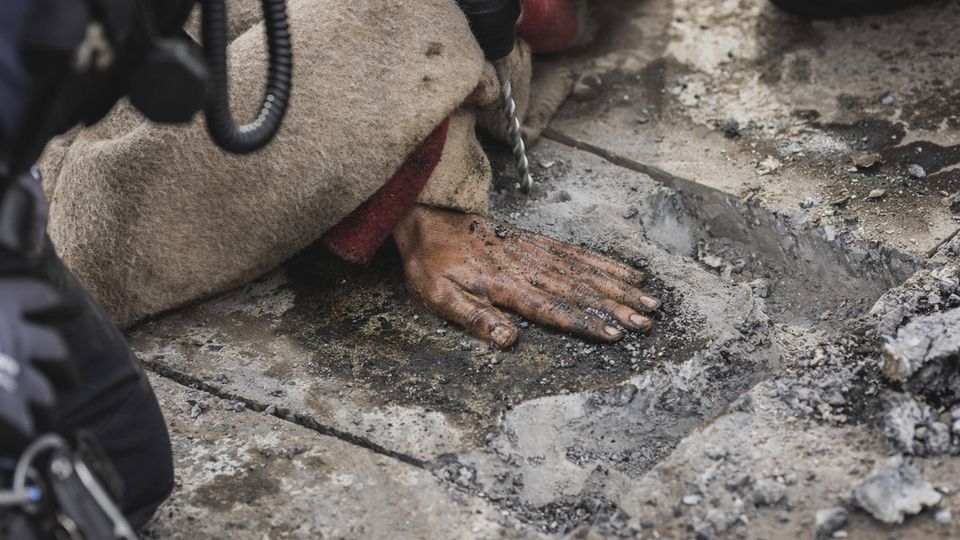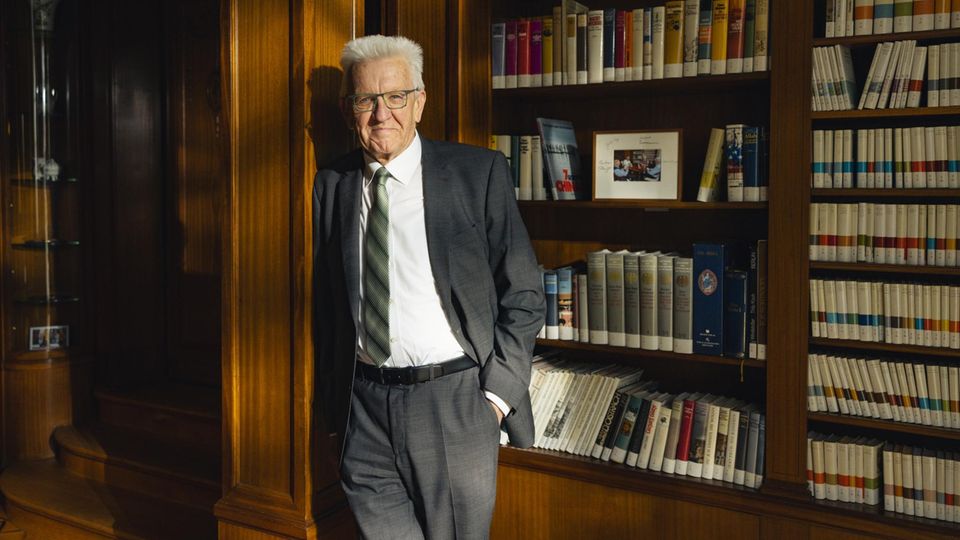The actions of the “last generation” are polarizing, also in politics. But the discourse is deadlocked. How can the climate policy conflict be resolved?
It gradually seems as if the “Last Generation” and political Berlin have rehearsed a choreography in the dispute over the most effective climate policy. Protest follows protest against protest, at the end of which there is protest again – and the cycle of confrontation begins again.
In any case, a few things seem to have changed since late summer 2021, when the then Greens co-head Robert Habeck sat under a pavilion in the government district with the founders of the protest movement, who were on hunger strike at the time, and discussed climate protection, or Olaf Scholz, still a SPD candidate for chancellor, little later clashed with the activists in a public debate. Anyway, they got together.
Climate policy bone of contention
In the meantime, a rather fruitless and contactless conflict between protesters and politicians can be observed, which hardly goes beyond mutual criticism – whether justified or not. Most recently, Habeck, now climate protection minister, criticized that this form of protest made climate protection “not capable of winning a majority”, would annoy people and divide society, and was therefore “not a helpful contribution to climate protection”. Chancellor Scholz made a similar, but different, statement, demanding concrete commitment from the activists. Christian Lindner, head of the FDP and Minister of Finance, says: Blocking streets is nothing more than “physical violence”. The climate activists see the “standstill” as a tool “to get the government to move out” as a wake-up call from “political impotence”.
The deadlocked discourse shows two things. First: The physical climate has actually changed in the past two years. While the activists threw oil or porridge on paintings to draw attention to their concerns, they are now trying to paralyze Berlin with blockades. In the meantime, they obviously consider the street, in people’s everyday life, to be the most effective place for their protest. Second: The excitement about it has become as ritualized in politics and society as the actions themselves. The confrontation shapes the debate. The actual conflict of how to deal with the climate catastrophe almost recedes into the background.
How can the conflict be resolved? The traffic light coalition – which after all wants to take everyone with it on the way to a climate-neutral Federal Republic of Germany – also provides few answers to this question. Politicians from the SPD, Greens and FDP express understanding for the lofty goals of the demonstrators, but are particularly conspicuous with their criticism of the means of protest instead of proposals for reconciling the positions.
When the necessary and the (politically) feasible collide
Federal Environment Minister Steffi Lemke is also concerned about the consequences of the rigorous protests. “On the one hand, I understand when people take to the streets for climate protection and also criticize governments for not doing enough,” she says. “I fear that frustration and anger among the population will increase in parallel with anger and frustration about insufficient climate protection.” In the end, no productive solution is supported in this way.
In fact, a relative majority of Germans (26 percent) see climate change as the most important issue that politicians need to address, like the current one ARD “Germany Trend” shows. Accordingly, the Ukraine war follows only in second place. At the same time, a vast majority considers the protest actions of the “last generation” to be inappropriate (81 percent) and even harmful to their climate protection concerns (86 percent), according to a survey by the “Augsburg General” resulted, which, however, was collected in November.
Polarization is increasing, and an ideologization of the debate can also be observed. For example, CSU boss Markus Söder calls for climate protection or transport “less ideology and more with facts” to work, Union faction vice Jens Spahn even accuses the traffic light of one with their plans for the heat transition “ideological struggle against home ownership” respectively. The Left Party’s co-chair, Janine Wissler, explains: “The biggest blockers are currently the government politicians who are clinging to a policy that ignores the climate goals.” The current environmental policy is a disregard for the Paris Agreement and the responsibility of the next generation.
It is undisputed that action must be taken in the fight against climate change. The government’s expert council warns that the goals set could be torn. But what needs to be done and at what pace? This is where the necessary and the (politically) feasible collide. “It’s going too slowly, no question, you’re right,” says Winfried Kretschmann, Baden-Württemberg’s green prime minister, about the activists of the “last generation” who are demanding faster climate protection measures. However, in a detailed discussion with the star also pointing out the need for a broad majority in society to support it.
You don’t have to explain to anyone anymore that climate change is real and a threat. “That’s why I think what the last generation is doing is simply pointless, worse still: It’s counterproductive,” says Kretschmann. Why? “Because they only upset the population with it. And those who feel patronized by climate protection measures see themselves confirmed: ‘They’re all crazy, they just want to tyrannize me.'” In the “concrete Sisyphus work” the “climate glue but zero point zero” help. “This radical renunciation that they preach won’t solve the problems because people won’t go along with it.”
“Successful climate protection keeps society together”
It’s a dilemma. The actions of the “last generation” may not be very effective, as Green Party co-leader Omid Nouripour noted, “nevertheless, falling into a defensive stance is just as unreasonable,” retorted Vasili Franco, domestic spokesman for the Berlin Greens, in a guest article for the “Daily Mirror”. “Anyone who does not want to rob future generations of their freedom must allow what is necessary to be articulated. Until politicians act.”
But how can the climate policy conflict be resolved or at least defuse?
“Successful climate protection keeps society together,” says Nina Scheer star. The climate protection and energy policy spokeswoman for the SPD parliamentary group calls for a massive expansion and systemic switch to renewable energies. The traffic light coalition has already initiated some things here, and further measures are being worked on. But Scheer also says that successful climate protection needs democratic foundations, in particular participation in the parties.
“I don’t think all the demands from the ranks of the people who are joining the protests today are beneficial for climate protection,” she says star. Some even consider her as a parliamentarian to be “very questionable”: “Demands should not be articulated as a social blockade, but should be dealt with in ways that our democracy provides for the formation of will – in the parties, clubs, associations and in parliaments.” She rejects a council of the kind demanded by the “Last Generation”.
The next few days could show whether the blockade can be resolved. Federal Transport Minister Volker Wissing, whose ministry is to some extent the focus of climate critics, wants to pick up the thread of the conversation about the “last generation”. On May 2nd, the FDP politicians and activists of the group, who had previously called for a meeting via Twitter, want to meet. “Talking and wrestling about climate protection: yes. Imposing your own will on others via blockades: no!” Wissing answered. He wants to talk to the group about it. “A lively democracy is characterized by a willingness to talk,” said the Minister of Transport.
Prime Minister of the Greens Kretschmann would also sit down at a table with representatives of the “last generation”, as he did in star-Interview said. “But you also have to hear my arguments, it won’t be funny.”




